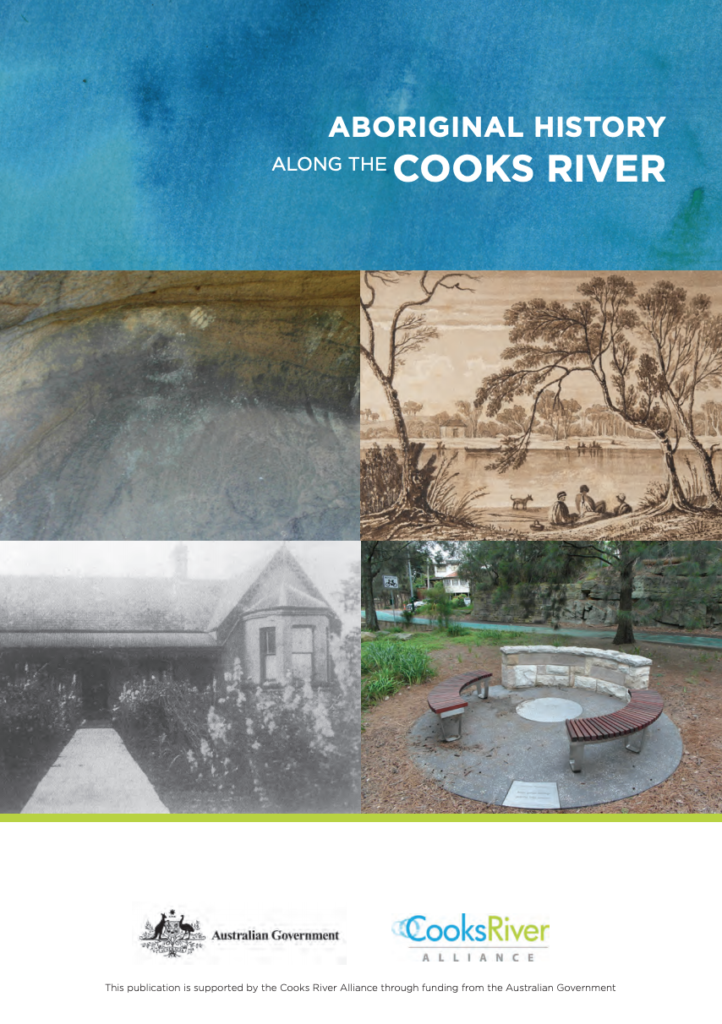Aboriginal and Torres Strait Islander people should be aware that this website contains images, voices and names of deceased persons.
Aboriginal people have lived along the Cooks River for more than a thousand generations, watching the lower river slowly take form over many millennia. The clans of the valley were known as the Wangal, Cadigal and Gameygal, ‘gal’ meaning the people of each clan area. They were impacted greatly by the arrival of Europeans, but Aboriginal people have continued to visit and use the river since that time.
Aboriginal people from other areas who have come to live along the river have developed a strong sense of custodianship for Aboriginal heritage and the environment. It remains a greatly valued river.
We do not know the traditional Aboriginal name for the Cooks River, though it undoubtedly had one. Wolli Creek appears to be the only name that has survived in popular usage today.
The Cooks River Alliance acknowledges the traditional custodians of the valley and celebrates and share these associations.
Cooks River Aboriginal History Project
There is a long history of Aboriginal associations with the Cooks River catchment found from the archaeological past, and oral and documentary history from more recent times.
In 2016, the Cooks River Alliance commissioned history and heritage firm MDCA to undertake the Cooks River catchment Aboriginal History Project. Out of this project, the Aboriginal History Along the Cooks River book was written by Dr. Paul Irish. It compiles and reviews previous research and records to create a comprehensive narrative of the Aboriginal history of the Cooks River catchment
Traditional Ecological Knowledge Project
How did Aboriginal people live in the Cooks River Catchment? This project uses historical records to share traditional ecological knowledge of the Cooks River catchment and computer simulation to create a virtual Cooks River prior to European settlement.
The interactive simulation developed by Brett Levy allows users to explore a virtual Cooks River, prior to European settlement, while completing a set of cultural tasks. As they progress, they learn about plants and animals, traditional practices such as constructing a gunya, building a canoe and making a fire and hearing the traditional Dreamtime stories associated with the land, the animals and the people.
Culture and Country Events
The Wurridjal Festival marks the start of a season when thousands of mullet – known as ‘wurridjal’ in the Aboriginal languages spoken in the Sydney region – enter the Cooks River during their pre-spawning migration along the east coast of Australia.
The Wurridjal Festival reminds us that for tens of thousands of years the river was healthy and a source of food for Aboriginal people. With 40+ free events throughout March, the festival highlights the river is highly valued and celebrated and that there is a determination to continue to restore it.
A Culture and Country event was held on June 16, 2017 to celebrate Aboriginal communities’ stories, histories, traditional knowledge and associations with the Cooks River.
Knowing our river
Jennifer Newman, Wiradjuri woman, Aboriginal history academic and long-serving executive member of the community-run Cooks River Valley Association, reflects on the Aboriginal history of the Cooks River and the important role that rivers play in our lives.
The video was produced by two Year 8 Canterbury Girls High School students as part of the Canterbury Earlwood Caring Community Centre’s intergenerational digital storytelling project – Gen2Gen: Cooks River Stories – involving young and older residents of Canterbury.


